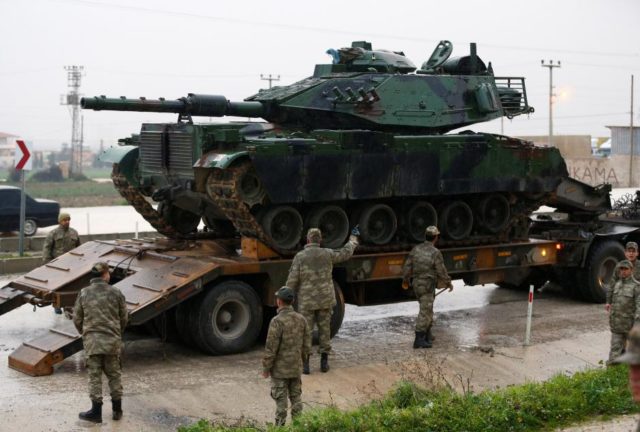
The Turkish military launched an offensive against Kurdish forces this week, firing artillery across its border into the northwestern Syrian town of Afrin. Ankara has built up military forces in the area for the past week and engaged other regional powers ahead of the assault.
Kurdish militia groups estimated that the Turkish army fired 70 shells at Kurdish forces shortly after midnight on Friday morning. Reuters TV crews verified that attack, filming Turkey firing artillery from the border village of Sugedigi.
Ankara’s campaign mostly targets the People’s Protection Units (YPG), a Kurdish militia comprising much of the U.S.-backed Syrian Democratic Forces (SDF) that fought Islamic State. Turkish leaders classify the group as a terrorist outfit for its links to the Kurdistan Workers Party (PKK).
The primary goal of the Turkish offensive will be to put pressure on the YPG in its Afrin enclave. Home to about one million people, mostly of Kurdish origin, the area comprises the westernmost reach of Kurdish control. It is unclear if Turkish ground forces will cross the border, but reports indicate Ankara’s local proxy, the Sunni-Arab dominated Free Syrian Army, is already mobilized to the east of Afrin in Azaz, Syria.
The intervention follows Euphrates Shield, a mid-2016 Turkish offensive in northern Syria to confront Islamic State in the border region west of Jarabulus. During that assault, Turkey bombed not only Islamic State fighters, but also rebuked the advance of Kurdish militias westward from Kobani. After the success of Kurdish forces in the east, Ankara worried that when Islamic State fell, the YPG would control about 300 contiguous miles of territory all the way from Afrin to the Iraqi border.
Ankara’s move angered officials in Damascus for violating Syrian sovereignty, even though the area has been out of the central government’s control for several years. The Turkish government seems to have come to an understanding with Syria’s patron, Russia. Al-Jazeera reported that Russia evacuated military observers away from Afrin following Turkey’s military chief Staff Hulusi Akar visit to Moscow on Thursday. He also indicated that he engaged Tehran as well, saying, “We are meeting the Russians and Iran on the use of airspace.”
While the U.S. has urged calm on both sides of the Syrian border, the timing of Turkey’s advance might be in response to Washington’s announcement that American forces would stay in eastern Syria to train about 30,000 fighters in areas under SDF control. Turkish President Recep Tayyip Erdogan characterize the plan as creating an “army of terror,” but the U.S. wants reliable local partners to prevent the resurgence of ISIS.

